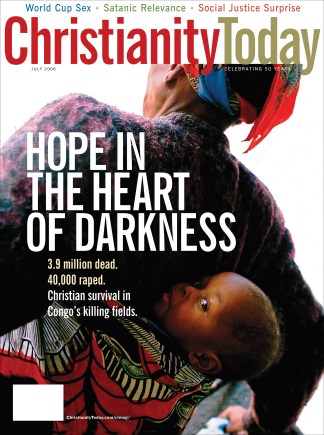Greater U.S. military involvement overseas has created a challenging situation for hundreds of thousands of National Guard and Armed Forces Reserve personnel, their families, their communities, and their churches.
In July 1999, after President Clinton ordered 33,000 Guard and Reserve members to support nato operations in the former Yugoslavia, Charles L. Cragin, acting assistant secretary of defense for reserve affairs, declared, "We really don't have a Reserve anymore," since the forces had been so frequently deployed to fulfill vital functions in times of combat.
But Cragin couldn't have envisioned the huge impact of the 9/11 attacks on the Guard and Reserve. Most Guard members signed up thinking they would serve their country in the wake of floods and hurricanes, or, at most, in international peacekeeping efforts. But the war against terrorism has meant putting Guard members into a constant state of extreme vigilance, demanded, for example, by insurgents who will set off a car bomb in order to lure recovery troops, only to set off a second bomb to increase the casualties.
When soldiers return home, this constant extreme vigilance translates into mental health challenges. According to a Walter Reed Army Institute of Research study reported by The New York Times, 19 percent of soldiers who served in Iraq "screened positive for a potential mental health disorder." Members of the Guard who served in Iraq scored even higher. Plus, "once home, National Guardsmen are largely left to their own devices," said the Times.
Chaplain Major John Morris of the Minnesota Army National Guard confirmed this for CT. Out of the 52 state militias, he is aware of only 5 that have "intentional reintegration efforts." Regular forces return to stateside military bases where they often have months in which to process their experiences with fellow soldiers, to take part in mental health programs, and to be held responsible by their chain of command for a constructive post-combat life. It isn't easy, but we give them support.
Guardsmen, on the other hand, have only a few days of demobilization. "The soldier does not have his combat buddies, does not have [his] chain of command, and is relying on a community that has no experience with war and has no idea how to help him with what he is struggling with," says Major Morris.
But the biggest issue, says Morris, is family—the spouse, children, and parents of our warriors. Many soldiers don't know how to talk to these family members about the horrors they experienced in combat. And the family members, too, have lived with loneliness and hardship. "Any pastor with a military family in his church," Morris told CT, must focus on these needs.
Morris has outlined steps churches need to take in dealing with combat veterans and their families. These include becoming "a 'military-friendly' church." This does not mean jingoistic support of American foreign policy, but sensitivity to these families, treating them like "any other distressed population in your parish." This may require proactive efforts, reaching out with practical help to military families, to deployed soldiers, and to returned warriors. It requires being alert for signs of distress—not waiting for distressed members to approach the clergy.
Major Morris reports that "churches are the hardest segment to enlist in the reintegration effort. We train employers, mental health workers, local government officials." But pastors seem slow to respond. Perhaps some clergy already feel confident dealing with veterans' problems. Others may not see themselves called to counseling ministry. Still others may be paralyzed by ambivalence about the war. Many smaller churches may not have any returning combat veterans. But every church that does have a returning Guard or Reserve member should be equipped for this ministry opportunity. The church that is sensitive to this opportunity can be an instrument of God's healing on all sorts of levels.
"Jesus ministered to soldiers," Morris reminds us. His body should be doing the same.
Major Morris's essay, "Veteran Ministry," has other resources for helping returning Guardsmen and Reservists.
Copyright © 2006 Christianity Today. Click for reprint information.
Related Elsewhere:
Also posted today is:
Speaking Out
Where Atrocity Is Normal | Understanding Christian soldiers who have seen the horrors of war.
Veteran Ministry | How churches can help soldiers and their families readjust after combat.










